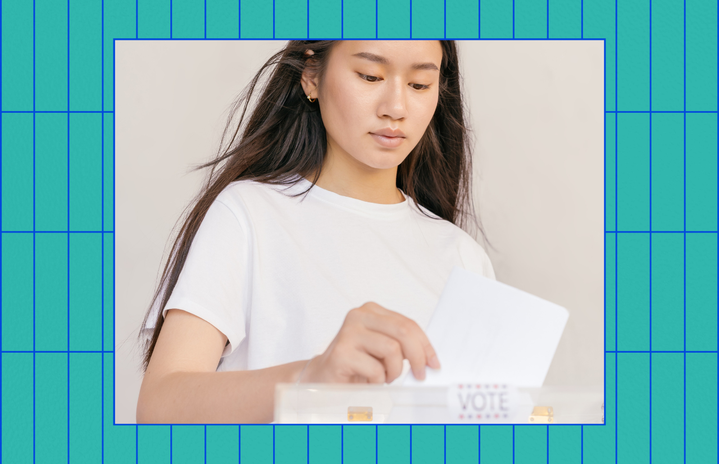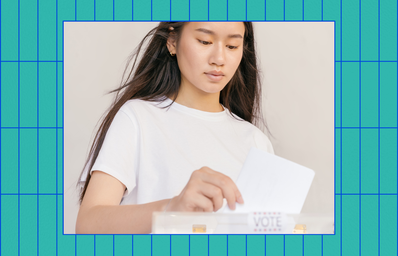I can’t speak for anybody else, but whenever I hear the word vote my mind immediately goes to ‘Ugh, politics.’ With everything that has been going on in our country lately, voting does not seem like the obvious solution.
Lately, I’ve been reading a few articles and seeing posts on social media about just how bad things are getting, and I felt a little bit disappointed. Not only in our country but in myself as well. I knew that my apathy towards voting contributes to this issue and that got me thinking… I have never had a conversation with any of my friends about voting. It’s not something I randomly bring up in the cafeteria waiting in line for overpriced noodles. Politics is a really heavy topic and a bit of a vibe killer to talk about in person with your friends, but at the same time – why are young South Africans, in particular, not having these conversations? Why are we shying away from those conversations?
Let’s look at the facts
- According to Stats SA, South Africa’s youth accounts for 35% of the population. This accounts for about 20.6 million of South Africa’s population. Furthermore, of that 20.6 million, 14 million young South Africans are unregistered.
- A study conducted in 2020 by Collette Schulz-Herzenberg titled “The South African non-voter: An Analysis” showed that only 15% of all eligible 18-19 year-olds placed a vote in the 2019 elections.
- Another report by the Institute of Security Studies found that many young people, aged 18 to 24, are distrustful of the current South African government.
Keeping all of this in mind, it’s clear that if we step up to the election polls in the 2024 national election, we could cause some serious changes in the structure of our government.
So…why are we not voting?
Why are young South Africans not voting?
According to an article published by the Mail & Guardian, there are a variety of reasons that explain why this key demographic is not voting.
- A lot of young South Africans feel as if their vote would not cause any real change. The general consensus among young people is that pollical parties and politicians lack accountability and that their vote would not influence how these politicians would exercise their power or make decisions that would benefit the public.
- The amount of corruption in our country has made many people distrustful of the government. This lack of trust is another major factor that puts many young people off from going to the polls and casting votes.
- There have been many instances in which the government has failed to deliver basic services, particularly services that directly impact the youth. These services include quality education and youth-friendly healthcare services. This makes it difficult for young people to vote for political parties that don’t seem to care about their basic needs.
- One of the biggest issues we’re facing right now is South Africa’s high youth unemployment rate. With our futures already being a major source of anxiety for many of us, the youth unemployment statistics are not helping. The first quarter of 2022 saw an unemployment rate of 63.9% for those aged 15 to 24 and a 42.1% unemployment rate for those aged 25 to 34 years old. This leads to even more dissatisfaction with political and economic systems.
- Finally, young people are not represented on candidate lists. How are we supposed to have faith in politicians that are decades older than us and out of touch with the issues that we face as a generation?
I could never quite pin down specific reasons as to why I was so apathetic to voting but after considering all the facts that I have just mentioned, I was thinking ‘Yeah, that sounds about right.’ However, after considering all of these statistics, it seems as if my apathy toward voting was actually a part of the problem.
How can we be encouraged to vote?
Not all of us are apathetic towards voting, in fact, many of us are very passionate about politics and social issues. The question is, how can we encourage ourselves and others to take voting more seriously?
To do this, we can:
- Increase our political literacy by educating ourselves and others in schools, as well as gathering information from reliable sources (easily available online).
- Find communities that align with your social/political views. This promotes social exchanges through debates and discussions which could increase political involvement.
- Support young people on candidate lists and work with them in addressing issues that affect the youth.
- If you are still unsure about which political party aligns with your views, there are many political societies at UCT that you could visit. It could be very beneficial to visit these societies to not only get an idea of the political landscape in South Africa, but to also have insightful conversations with other young people about the political issues facing us today.
it all boils down to us
Essentially, our apathy towards voting creates a cycle that allows the problems we have in our country to persist. If we are unhappy with the structure of our government or the economic/political issues in our country, how can we expect those circumstances to change if we don’t incite any of those changes?
Our generation has been deemed one of the most vocal generations when it comes to social, political, and economic issues. We are not afraid to speak our minds and challenge the powers that be. However, a lot of our activism takes place from the comfort of our own homes. What I mean by this is that as well-intentioned as we are, a lot of our activism stems from social media. Don’t get me wrong, social media has done wonders in creating awareness for various issues, but we also need to realize that real change also requires us to make changes in the real world.
This includes volunteering at organizations that support important social causes, participating in peaceful protests, and yes, voting.
I know that my attitude toward voting has changed from this point onwards. It’s easy to just feel like another number when it comes to voting. However, your single vote could decide whether our country could see a change or whether things will only stay the same. The reality is that we are the future inhabitants of this country and if we want to make it a better place for ourselves and future generations, we need to take the decision into our own hands and make our way to the polls.


